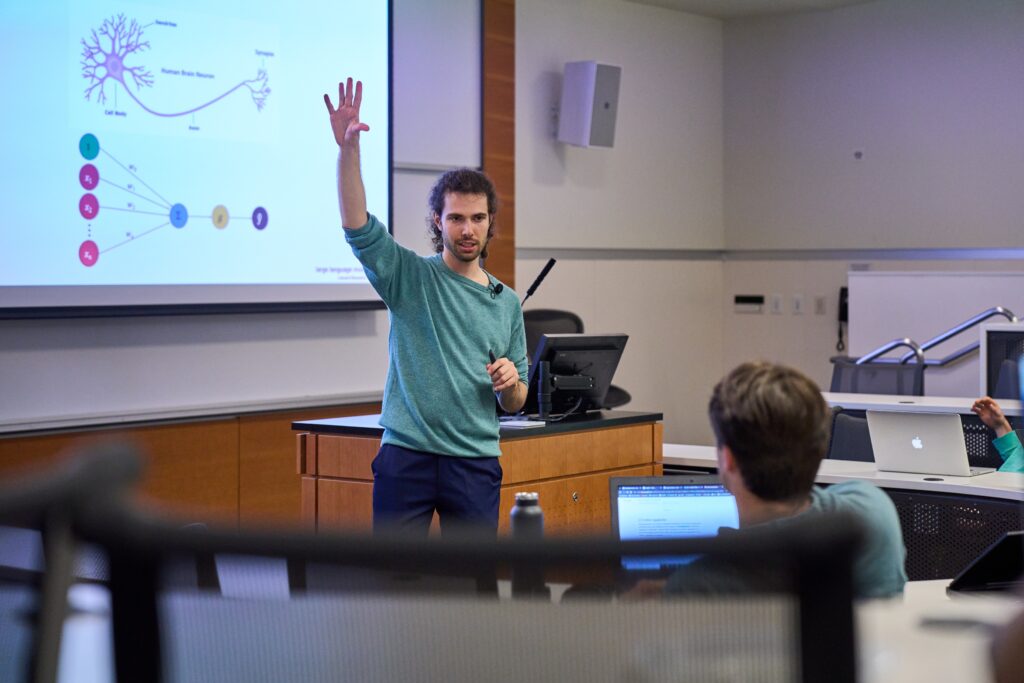
A New Era of AI and Human Ingenuity in the Classroom
Foster faculty are empowering students to be "AI champions" — innovators who can harness AI as a tool to solve problems.
As artificial intelligence (AI) continues its rapid advance, business schools are grappling with teaching AI to the next generation. At the University of Washington’s Foster School of Business, Assistant Professor Léonard Boussioux is at the forefront, creating new ways to inspire students, staff, and faculty with the creative potential of AI. Read on to see how this is unfolding in two new courses.
(Editor’s note: Two staff members met with Professor Boussioux to learn about his work teaching AI at Foster. He inspired us to evaluate and use AI tools to create this article. We share more about our experiences in the editor’s notes below.)
Teaching AI at Foster
For Boussioux, teaching AI at Foster is much more than conveying technical skills. It’s about empowering students to be “AI champions” —innovators who can harness AI as a tool to augment their capabilities and solve problems. His courses, “Generative AI in the Era of Cloud Computing” for Master of Science in Information Science students, and “Forging AI Champions: A Transformative Generative AI Teaching Experience” for undergraduate students, encapsulate this approach.
“I believe that every single company and organization will try, or is trying, to leverage AI for a broad range of use cases,” Boussioux explains. “AI can be deployed to enhance and replace mundane tasks that can be safely automated. This isn’t a threat to workers, but rather an opportunity to focus on more creative solutions—work that makes a greater impact and solves harder problems.”
At Foster, Boussioux developed a comprehensive curriculum from scratch. It covers technical content such as deep learning, large language models, and diffusion models. His courses emphasize critical thinking, ethical reasoning, business acumen, and creative problem-solving abilities.
Teaching AI as an immersive experience
Like all Foster faculty, Boussioux’s overarching goal is to prepare students for the future of work. This mindset underpins everything he does in the Foster classroom. Rather than lecturing students on theory, Boussioux immerses them in a firsthand experience (just as he did with the writers of this article). He guides them to co-create with AI models, explore AI’s boundaries through interactive demos, and build prototypes that industry experts later evaluate.
As an educator, Boussioux strives to make teaching AI a much more creative endeavor, integrates music, art, and immersive experiences into each class. His lectures are as much a performance as an educational event. He moves around the room, simulating his thought process aloud and acting out scenarios to make concepts more grounded and memorable. Every 30 minutes, he includes interactive elements such as generating images, videos, or music together with the class.
(Editor’s note: Speaking of mundane tasks, at this point in the interview Professor Boussioux suggested that we use an AI tool called otter.ai to generate a transcript of our conversation. We stopped notetaking and he gave us a quick demo. The result? otter.ai delivered a reliable transcript and we focused on the conversation, not typing.)

(Editor’s note: Using AI tools to craft this article didn’t save us time. According to Professor Boussioux, this isn’t surprising. AI can accelerate a project to get us closer to 60 or even 80% of what we need. But the final 20%—when we integrate expert knowledge—is essential for producing high-quality work. As a result, using AI tools gave us more time for the final 20%.)
From AI guilt to AI champions
Teaching AI as an immersive experience is by design. Boussioux recognizes that students often feel “AI guilt” or anxiety that leaning too heavily on AI will stunt their growth or make them lazy. His response is to deconstruct those fears, instilling a new “AI champion” mindset.
“I hope to inspire students to become AI champions,” he says. “Every company is thinking about generative AI or already using it. However, we don’t know the full extent of the tools available. We don’t understand the best way to interact. We are fearful of making a mistake. There lies the opportunity: students can become champions for their future employers and potentially unlock new job opportunities.”
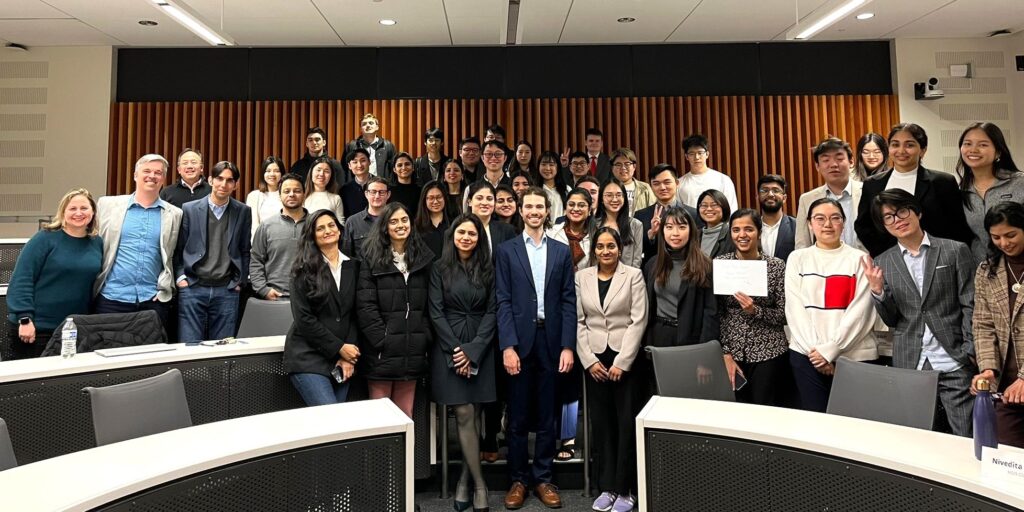
For Boussioux, becoming an AI champion means developing a nuanced understanding of AI’s strengths, limitations, and ethical implications. It means learning how to judiciously apply the right AI model to the right task. It means taking the raw outputs and iterating on them through creative thinking. And it means bridging the gap between AI’s astonishing capabilities and human ingenuity.
“Most models are extremely good at making you believe they have sentience,” Boussioux tells his students. “But those AI models don’t have a body. They can’t experience the world as individuals. The capacity to be novel—being one-of-a-kind—is a truly human experience. That’s the real divide between humans and AI, and where the greatest opportunity lies.”
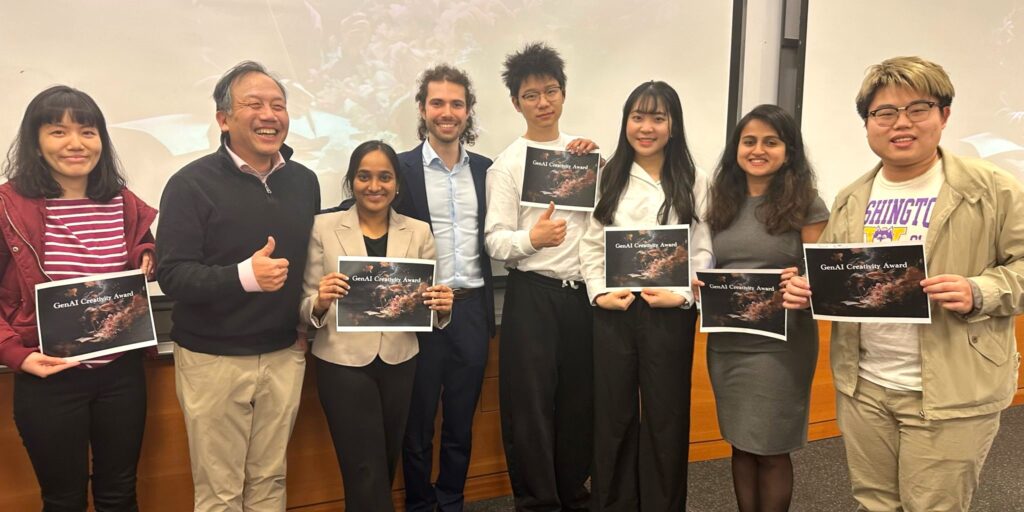
(Editor’s note: It’s not only students who have AI guilt; writers do too. At Professor Boussioux’s suggestion, we used an AI writing tool called Claude to create a first draft of this article, using the transcript generated by otter.ai. This article includes some AI-generated copy.)
Understanding the human aspects of AI
Building a symbiosis between humans and AI is central to Boussioux’s courses at Foster. He spends significant class time on AI’s “human aspects”: fostering creativity, self-confidence, teamwork, and communication skills. He stresses that personal passions and motivations are the pathway to unleashing creative potential with AI.
For Boussioux, teaching AI is less about teaching technology and more about shaping the next generation of innovative, ethical, and emotionally intelligent leaders.
“Most students don’t need to know more about AI,” Boussioux asserts. “They need to trust what they can do and build their confidence. Teaching AI is more about instilling confidence than teaching how to use specific AI tools and platforms.”
At Foster, it’s an approach that resonates.
Students have taken to enthusiastically highlighting their AI-powered projects on LinkedIn. And, in a compressed three-week period, students in the Master of Science in Information Science “Generative AI” class produced what Boussioux describes as “amazing projects that went beyond what a typical group could accomplish.” (You can find a range of examples of student work at the end of this article.)
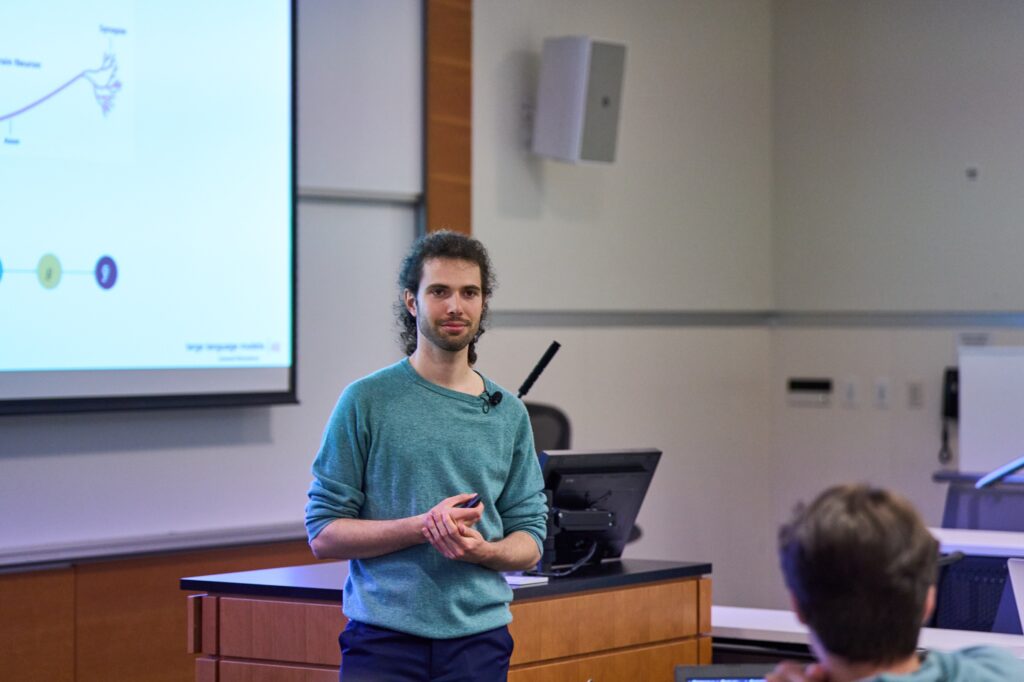
(Editor’s note: One aspect of our conversation that AI couldn’t replicate was the excitement of learning from Foster faculty like Professor Boussioux. Much like Foster students, we left the classroom with new energy and excitement about using AI professionally.)
Teaching AI for everyone
Looking ahead, Boussioux envisions teaching AI as a “horizontal” component across all disciplines at Foster, empowering students of entrepreneurship, accounting, marketing, and beyond to become AI champions in their respective fields. He advocates an interdisciplinary model that exposes students to a breadth of ideas.
“Having too many silos breaks trust between people and prevents collaborations from happening,” he contends. “I emphasize more and more multidisciplinary learning opportunities. AI should be for everyone.”
By fusing human creativity with AI, Foster students gain a powerful toolkit and a competitive advantage in the workplace, where they can turn audacious ideas into reality.
AI represents uncharted territory with enormous potential and risk for business. Foster faculty are charting the course, ensuring the workforce of tomorrow can navigate that frontier with equal mastery of technical skills and human wisdom.
(Editor’s note: otter.ai was a good meeting note-taker, and Claude, which bills itself as a next-generation AI assistant, churned out a good first draft of this article. Give it a try the next time you have writer’s block. We will.)
Chronicling student learnings on LinkedIn
During the 2023-2024 academic year, Foster students enthusiastically embraced the opportunity to create with AI in the classroom. Students in Foster’s Master of Science in Information Science program even shared their work on LinkedIn.
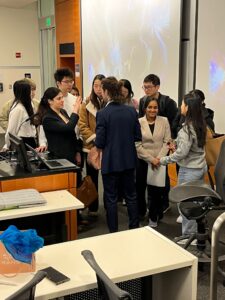
Here’s a sampling:
- Isha Patel: A highlight of this quarter was developing MindSight AI, a project aimed at early detection of mental disorders among university students, with a focus on supporting international students. This experience has not only enriched my technical skills but also emphasized the importance of empathy and collaboration in tech innovations.
- Daniyal Sulaiman: Out of all the courses I have taken, Generative AI has been my absolute favorite, I never knew learning about it could be so fun! A big shout-out goes to my incredible Professor Léonard Boussioux, whose expertise and creativity know no bounds! He not only made concepts like Convolutional Neural Network and Diffusion Models easy to understand but has fueled my passion to pursue Machine Learning and AI as a career.
- Cheryl Hsiao: Our team embarked on a journey to design an innovative situation puzzle, which not only stretched our creative limits but also deepened our understanding of AI… This accomplishment underscores the transformative potential of merging creativity with AI, igniting my passion for AI and its capacity to redefine problem-solving and spur innovation.
- Arjun S.: This pushed us to explore different possibilities and made diving deeper into LLMs less daunting.
- Mazda Hutapea: Looking ahead, I’m thrilled to admit that my once modest interest in GenAI has blossomed into a genuine passion, particularly in the realm of GenAI education.
- Deepal Heda: We had the privilege of presenting our concept to industry leaders renowned for their expertise in Generative AI, who recognized our creativity and the significance of our work, highlighting the impact of our achievement alongside nine other outstanding teams.
About Léonard Boussioux
Léonard Boussioux is an Assistant Professor at the Michael G. Foster School of Business and Adjunct Assistant Professor at the Paul G. Allen School of Computer Science & Engineering at the University of Washington. His research combines operations research, machine learning, and artificial intelligence. He has developed and deployed machine learning and deep learning models to address high-stake challenges, including healthcare operations, pollution management, hurricane forecasting, and ecosystem preservation. He recently launched an educational effort, Universal Artificial Intelligence, to disseminate state-of-the-art technological insights to vast audiences. He mentors and teaches at all levels of subjects, such as optimization, data science, machine learning, AI, and more, to empower anyone to contribute analytical solutions for a better world.
Explore Foster’s MBA and Specialty Master’s programs.
